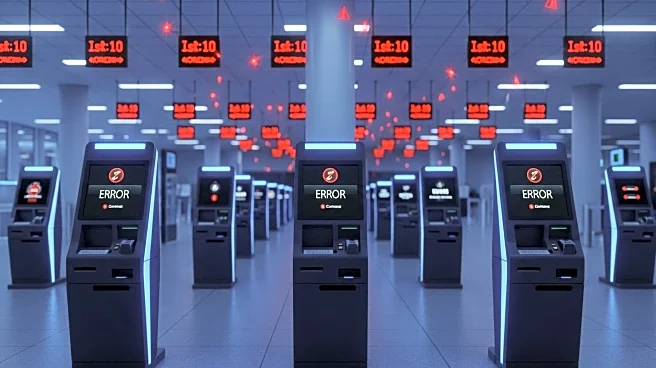What's Happening?
A cyberattack targeted check-in and boarding systems at several major European airports, including Brussels, Berlin's Brandenburg, and London's Heathrow, causing disruptions and delays. The attack affected the systems provided by Collins Aerospace, which are used for passenger check-in and baggage dispatch. While the impact on travelers was limited, the incident exposed vulnerabilities in airport security systems. Experts suggest the attack could have been orchestrated by hackers, criminal organizations, or state actors. The disruption led to flight cancellations, redirections, and delays, with airports advising travelers to check their flight status.
Why It's Important?
The cyberattack highlights the vulnerabilities within the aviation industry, particularly due to its reliance on shared digital systems. Such attacks can exploit third-party platforms, causing widespread disruption across borders. The incident underscores the need for enhanced cybersecurity measures in the aviation sector to protect against future threats. The attack's impact on major airports could lead to increased scrutiny and investment in cybersecurity infrastructure, affecting airlines, passengers, and airport operations. The aviation industry must address these vulnerabilities to prevent similar incidents and ensure the safety and efficiency of air travel.
What's Next?
Airports and airlines are likely to review and strengthen their cybersecurity protocols to prevent future attacks. Collins Aerospace is actively working to resolve the issue and restore full functionality to its systems. The aviation industry may see increased collaboration with cybersecurity firms to safeguard against potential threats. Regulatory bodies could implement stricter cybersecurity standards for third-party vendors. Passengers may experience temporary inconveniences as manual check-in processes are used until systems are fully restored. The incident may prompt discussions on the role of cybersecurity in critical infrastructure protection.
Beyond the Headlines
The attack raises questions about the ethical and legal responsibilities of third-party vendors in maintaining secure systems. It also highlights the potential for cyberattacks to disrupt essential services, emphasizing the need for comprehensive cybersecurity strategies. The incident could lead to long-term shifts in how the aviation industry approaches digital security, with a focus on resilience and risk management. The attack serves as a reminder of the interconnectedness of global systems and the importance of international cooperation in cybersecurity efforts.










